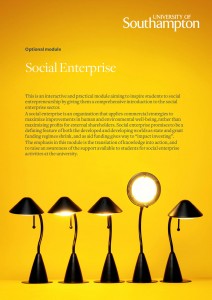Guest Blog by Pathik Pathak
Thanks to the efforts of a range of institutions and individuals –most prominently Unltd in partnership with HEFCE (Higher Education Funding Council for England) – a large proportion of British universities have embraced social entrepreneurship in some shape or form.
Despite the widespread interest in finding, funding and supporting social entrepreneurs in higher education, embedding social entrepreneurship in the curriculum remains a key challenge. Here at Southampton we have launched an interdisciplinary module in Social Enterprise which is open to students of all year groups and across all disciplines. The module has been a year in the making and there has been a steep learning curve. Here are the six main challenges I’ve encountered on my journey:
1) Winning initial support.
It’s difficult to gain buy-in for a social enterprise course unless your university has an inclusive and distinctive vision of entrepreneurship. The more inclusive the vision of entrepreneurship – and the more enterprise connects to the institution’s other strengths in research, innovation and outreach – the better. It’s not enough to ape exemplars in the field; not every university in the country should be a Northampton. At Southampton we understand entrepreneurship as human-centred problem solving, and innovation-led entrepreneurship with an international dimension is central to our vision for entrepreneurship.
2) Ensuring disciplinary diversity.
To date, a lot of social enterprise activity in higher education has been routed through business schools. There’s nothing intrinsically wrong with that, but it has meant a focus on enterprise rather than the social, and perhaps a neglect of innovation also. In our experience true innovation occurs when students from different backgrounds collaborate on a human-centred challenge. Business discipline is vital, of course, but it shouldn’t be the primary lens through which social entrepreneurship is either conceptualised or learnt. An inclusive vision of entrepreneurship is crucial to attracting students outside management or business – as well as winning over decision makers in different faculties who decide which options their students can take.
3) Providing ongoing support.
Social enterprise courses which exist in a vacuum don’t work. Their success depends on how well integrated they are with the forms of enterprise support available through the university or the student’s union (or external bodies working on campus). Tying the course in with social investment and mentoring opportunities goes a long way to ensuring that students don’t feel abandoned when the course ends. It also provides a useful measure of the success of a course: student satisfaction is great, but how many go on to start their own venture?
4) Plugging into the ecosystem.
We are blessed, in the UK, with a plethora of innovative organisations whose mission is to support individual social entrepreneurs. NACUE, Student Hubs, MakeSense, the Young Foundation and of course Unltd are some of the biggest players, but there are others. These organisations are brilliant for three reasons: they make their learning resources openly available, they provide social investment and mentoring, and they put on hugely energising
events.
5) Making it practical.
Universities – especially in the Russell Group – have the turning circles of 1980s Volvo estates but very few now believe they can choose not to evolve. Part of this evolution is recognising that imparting disciplinary knowledge is no longer enough. I firmly believe that higher education 2.0 involves a shift to experiential ground. This doesn’t involve decoupling research from curriculum, but creatively mobilising research to solve real world problems. On our course we encourage students to recognise existing knowledge in the university when they seek to meet a human design challenge, and consider how it might inform their design of possible solutions.
6) Embracing failure.
Social enterprise courses have the potential to position themselves in the vanguard of this new higher educational landscape, but to do that they must allow students to experiment, learn, iterate and reflect. What universities can offer, which other institutions cannot, is an environment in which is to safe to ‘fail’ and where failure is embraced as necessary to the process of innovation, self-awareness and learning as a whole.
This blog post is reproduced from an article by Pathik Pathak for the Guardian.
